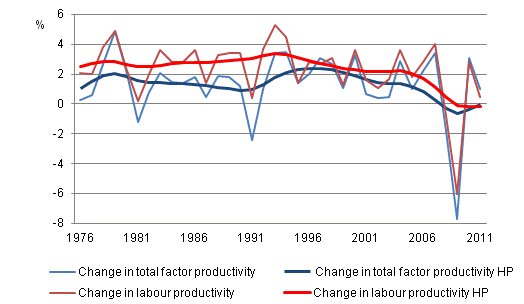Published: 30 November 2012
Development of productivity in the national economy 1976-2011*
Based on preliminary national accounts data, the growth rate of labour productivity in the whole na-tional economy was 0.5 per cent in 2011, having been 2.8 per cent in 2010 and 6.0 per cent in 2009. The respective growth rate of total factor productivity was 1.0 per cent in 2011, having been 3.1 per cent in 2010 and -7.7 per cent in 2009.
Development of productivity in the whole national economy 1976-2011*, %

The Hodrick-Prescott filtered long-term growth trend (HP) indicates that the pace of growth in labour productivity has slowed down strongly in the whole economy since the mid-1990s, from 3.5 per cent to -0.2 per cent in 2011 (Fig. 1). Although the annual growth rates for individual years (2000, 2004, 2007 and 2010) have been around three per cent, the trend in labour productivity has been declining since the mid-1990s.
The respective long-term growth trend for total factor productivity shows that total factor productivity fluctuated between 1.5 and 2.0 per cent before the year 1993. Between 1993 and 2000, total factor productivity grew at the average rate of 2.0 to 2.5 per cent per annum. Since 2000, the growth trend of total factor productivity has slowed down strongly.
Table 1 shows average annual changes of total factor productivity and labour productivity in different time periods. In addition, the table shows capital input, worked hours and labour composition contributions to value added growth, and capital intensity change and labour composition change contributions to labour productivity growth.
The contribution of labour composition to value added growth was strongest during the recession in 1990-1994, being on average 0.7 per cent per annum. In the other periods, the contribution of labour composition to value added growth has been 0.2-0.3 percentage points per year. The contribution of capital intensity growth to value added has been fairly stable, at an average 0.7-1.0 percentage points per year. Growth has only been lower during the period 1990-1994, about 0.3 percentage points per year.
Average growths of productivity in the whole national economy, 1976-2011*
| 1976-1989 | 1990-1994 | 1995-1999 | 2000-2004 | 2005-2011 | |
| Value added volume, change, % | 3,3 | -0,8 | 4,4 | 2,9 | 1,2 |
| Capital input contribution, change, % | 1,0 | 0,3 | 0,7 | 0,8 | 0,6 |
| Worked hours contribution, change, % | 0,4 | -3,2 | 1,5 | 0,4 | 0,3 |
| Labour composition contribution, change, % | 0,3 | 0,7 | 0,2 | 0,2 | 0,1 |
| Multi-factor productivity, change, % | 1,5 | 1,3 | 2,1 | 1,6 | 0,2 |
| Capital intensity contribution, change, % | 0,9 | 1,4 | 0,1 | 0,6 | 0,5 |
| Labour composition contribution, change, % | 0,3 | 0,7 | 0,2 | 0,2 | 0,1 |
| Labour productivity, change, % | 2,7 | 3,5 | 2,3 | 2,3 | 0,7 |
Source: Productivity surveys 2011. Statistics Finland
Inquiries: Jan Klavus 09 1734 3391, Antti Pasanen 09 1734 2629, skt.95@stat.fi
Director in charge: Ari Tyrkkö
- Tables
-
Tables in databases
Pick the data you need into tables, view the data as graphs, or download the data for your use.
Updated 30.11.2012
Statistics:
Productivity surveys [e-publication].
ISSN=2343-4333. 2011. Helsinki: Statistics Finland [referred: 18.2.2026].
Access method: http://stat.fi/til/ttut/2011/ttut_2011_2012-11-30_tie_001_en.html

